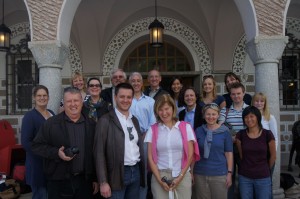Teaching and Clinical Training
My primary teaching interests at the graduate level at UNC are consistent with my research interests. I teach graduate students how to work with couples through our Couples Clinic by offering a two-semester practicum focusing on the integration of theory, research, and clinical application of interventions to assist couples in a variety of contexts. I believe that one of the strengths of this clinical training is the in-depth supervision we provide to students. Some of the advanced doctoral students who have a particular interest in couples assist me with running the clinic and therefore learn how to develop and operate a couple therapy clinic. I also provide students with the opportunity to learn how to develop and conduct intervention and prevention programs for couples, such as those described in the research section of this site. Through these experiences, students help to gather empirical data on the efficacy of the interventions while providing needed clinical services.

We also provide clinical training to therapists in other contexts outside of UNC, which enables us to disseminate our treatment research findings in an applied manner. We have conducted clinical training workshops for therapists in many countries around the world, focusing on the treatment of relationship distress, infidelity, and couple-based interventions when one partner is experiencing psychopathology or a health problem. In some instances, this process includes providing ongoing clinical consultation and supervision at a distance using modern, digital communication. The clinical training and supervision are supplemented with books and chapters that our colleagues and we have written about couple therapy as well as commercially produced DVDs featuring my interventions with couples, produced by the American Psychological Association (APA DVD) and the Association for Behavioral and Cognitive Therapies (ABCT DVD).
The philosophy and model of clinical training that we have developed over the years are described in the following journal article:
Baucom, D.H., & Boeding, S. (2013). The role of theory and research in the practice of cognitive-behavioral couple therapy: If you build it, they will come. Behavior Therapy.

We seek other avenues for disseminating interventions that have strong empirical support as well. To that end, I served on the board of directors of the Klaus Grawe Foundation in Zurich, Switzerland, which has as its mission to disseminate empirically supported programs to the public through a variety of delivery systems for individuals, couples, families, businesses, and institutions.
To conduct research on clinical interventions with couples and train and supervise therapists, I believe it is important that I remain active clinically as well. Therefore, I see a limited number of clients myself, and I continue to find this work to be both stimulating and rewarding.
I am honored that the doctoral students in clinical psychology have selected me twice as the recipient of an award for outstanding clinical supervision, based on my work with the Couples Clinic, and that UNC has granted me awards for excellence in undergraduate teaching and graduate instruction, along with a lifetime mentorship award.